Mailtrack: 17 emails to knighted professors, 2 read. Last month's blog post on email interception is my new flagship post for a snapshot picture of the blocking of our email for years and excessive targeting of particular categories of emails
Almost all the images in this blog post had to be transferred to an alternative host website for rectification. It seems that since last Friday images in this Church and State blog that are held in MediaFire may have been restored to their true size.
I wish to sign on as an honorary associate of church and state.
A Nobel Laureate this year
Our list of 300 Honorary Associates includes 20 Nobel Prize laureates, 18 US National Medal laureates and 12 knighted professors notwithstanding the excessive targeting of these categories of emails in particular. Last week Declan had the honour of adding the 20th Nobel laureate to the list, having had an average of 85% of his emails blocked for over a week.
Article 10 of the European Convention on Human Rights and Fundamental Freedoms formulates what is the core of free speech. "Everyone has the right to freedom of expression." In an important interpretation of this article, the European Court of Human Rights in Handyside v. UK (1976) indicated that this "freedom of expression" should be construed as follows. It "is applicable not only to 'information' or 'ideas' that are favourably received, or regarded as inoffensive, or as a matter of indifference, but also to those that offend, shock or disturb the State or any sector of the population". Such are the demands of that pluralism, tolerance and broadmindedness without which there is no "democratic society" (see Cliteur, 2010).
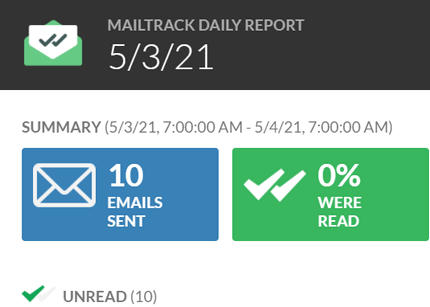
Mailtrack reports that of Declan's 17 emails to knighted professors this week, only two have been read.
Mailtrack Daily Reports
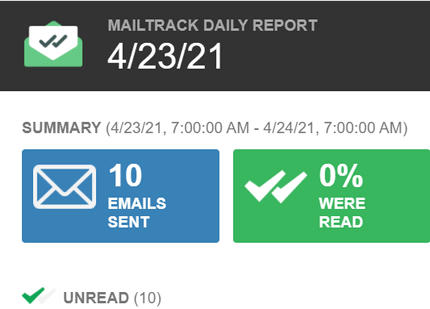
Our Average Daily Best for years has been 30-40% read.
1. 19/04: 10 emails sent, 0 read; 0% read.
2. 20/04: 12 emails sent, 4 read; 33% read.
3. 21/04: 13 emails sent, 2 read; 15% read.
4. 22/04: 10 emails sent, 2 read; 20% read.
5. 23/04: 10 emails sent, 0 read; 0% read.
6. 24/04: 15 emails sent, 2 read; 13% read.
7. 25/04: 15 emails sent, 1 read; 7% read.
8. 26/04: 12 emails sent, 3 read; 25% read.
Average Best: 13% read; 97 emails sent, 14 read.
Only 2 emails read following a daily report.
For three days in a row, commencing on 19 April, Declan was unable to track previously sent emails. On 20 April we found four such emails binned. We have had massive amounts of draft documents deleted in the past, but, to the best of our knowledge, this deletion of sent emails is unprecedented. We have had already in place systems to weather any extent of this latest assault on our email.
Your email was indeed blocked as "junk". You may use my name as an honorary associate.
A Nobel Laureate in 2007, after one of many telephone conversations Declan has had to try to get emails through.

All ten of these unread emails were to Nobel Laureates.
Our Average Daily Best for years has been 30-40% read.
1. 19/04: 10 emails sent, 0 read; 0% read.
2. 20/04: 12 emails sent, 4 read; 33% read.
3. 21/04: 13 emails sent, 2 read; 15% read.
4. 22/04: 10 emails sent, 2 read; 20% read.
5. 23/04: 10 emails sent, 0 read; 0% read.
6. 24/04: 15 emails sent, 2 read; 13% read.
7. 25/04: 15 emails sent, 1 read; 7% read.
8. 26/04: 12 emails sent, 3 read; 25% read.
Average Best: 13% read; 97 emails sent, 14 read.
Only 2 emails read following a daily report.
For three days in a row, commencing on 19 April, Declan was unable to track previously sent emails. On 20 April we found four such emails binned. We have had massive amounts of draft documents deleted in the past, but, to the best of our knowledge, this deletion of sent emails is unprecedented. We have had already in place systems to weather any extent of this latest assault on our email.
I am truly appalled by the unlawful violation of the Heavey's basic right to send and receive email without interference. I would be most grateful for anything you may be able to do by way of taking measures to correct this gross abuse.
An American professor to then Home Office Minister Lynne Featherstone in 2010
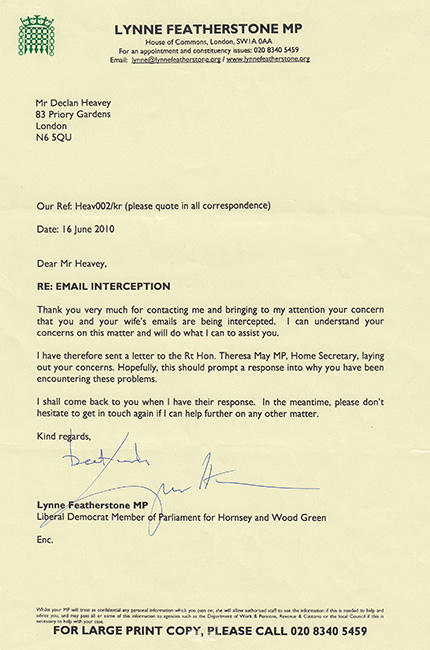
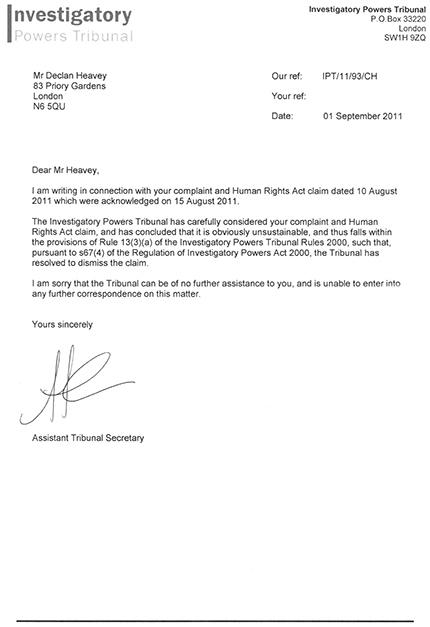
The Investigatory Powers Tribunal has carefully considered your complaint and Human Rights Act claim, and has concluded that it is obviously unsustainable, and thus falls within the provisions of Rule 13(3)(a) of the Investigatory Powers Tribunal Rules 2000, such that, pursuant to s67(4) of the Regulation of Investigatory Powers Act 2000, the Tribunal has resolved to dismiss the claim.
'Independent' court scrutinising MI5 is located inside Home Office http://t.co/ZezpDipCPx via @guardian
— Ian Cobain (@IanCobain) March 5, 2014
Laptop interference: For 14 weeks it's been cuts to the targeted laptop from the internet and speeds lower than 1 Mbps. This week Declan's primary laptop has been functioning at 1 Mbps (16 Mbps today) and he's been twice cut from the internet.
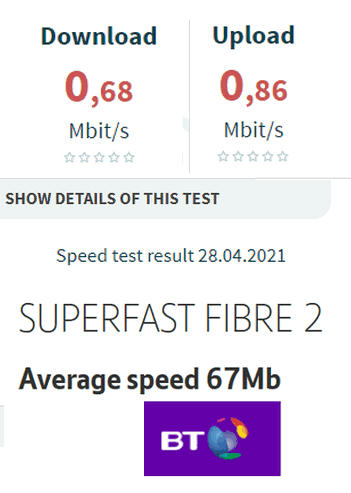
The targeting of one or more of our four operational laptops kicked off again in December 2020. It's either cut the targeted laptop(s) from the internet (twice yesterday) or slow down speeds to anything from 74 Mbps to less than 1 Mbps.[1] For four weeks it was an average 5 Mbps on Declan's primary laptop until 26 March, when it was 71 Mbps, the first time over 70 Mbps since last December (16 Mbps today). With his secondary laptop, it was an average 20 Mbps for three weeks until 26 March, when it was 61 Mbps, one of the few times over 60 Mbps since last December (62 Mbps today). Seldom have two laptops been treated the same way at any one time, unless we have been cut off the internet altogether for anything up to 7 days to date. This month is an unprecedented sixth consecutive month for this sustained targeting of one or more of our laptops. (Tuesday 6 April was the second day since last December that Declan had two laptops functioning above 50 Mbps, and last Friday was only the fourth day within the same period that his primary laptop was back to the usual normal of above 70 Mbps.)
7 February 2019: The targeting of our two primary laptops runs into a record-breaking third month. My primary laptop has been targeted for over three months (WITH UPDATE 23/12/20)
__________________________
[1] The sustained cutting of Declan's secondary laptop from the internet continued throughout the morning of 2 April (nine cuts in total) as he updated with two laptops the Futurism section of our Church and State website for Rumelhart Prize laureates. The following week we had the honour of listing a third Rumelhart Prize laureate as an Honorary Associate. The Rumelhart Prize was founded in 2001 to introduce the equivalent of a Nobel Prize for cognitive science.

The targeting of one or more of our four operational laptops kicked off again in December 2020. It's either cut the targeted laptop(s) from the internet (twice yesterday) or slow down speeds to anything from 74 Mbps to less than 1 Mbps.[1] For four weeks it was an average 5 Mbps on Declan's primary laptop until 26 March, when it was 71 Mbps, the first time over 70 Mbps since last December (16 Mbps today). With his secondary laptop, it was an average 20 Mbps for three weeks until 26 March, when it was 61 Mbps, one of the few times over 60 Mbps since last December (62 Mbps today). Seldom have two laptops been treated the same way at any one time, unless we have been cut off the internet altogether for anything up to 7 days to date. This month is an unprecedented sixth consecutive month for this sustained targeting of one or more of our laptops. (Tuesday 6 April was the second day since last December that Declan had two laptops functioning above 50 Mbps, and last Friday was only the fourth day within the same period that his primary laptop was back to the usual normal of above 70 Mbps.)
7 February 2019: The targeting of our two primary laptops runs into a record-breaking third month. My primary laptop has been targeted for over three months (WITH UPDATE 23/12/20)
__________________________
[1] The sustained cutting of Declan's secondary laptop from the internet continued throughout the morning of 2 April (nine cuts in total) as he updated with two laptops the Futurism section of our Church and State website for Rumelhart Prize laureates. The following week we had the honour of listing a third Rumelhart Prize laureate as an Honorary Associate. The Rumelhart Prize was founded in 2001 to introduce the equivalent of a Nobel Prize for cognitive science.
All taken from last month's blog post (save today's information) about email interception, which is my new flagship post on the sabotage of our email going back 14 years to 2007.

